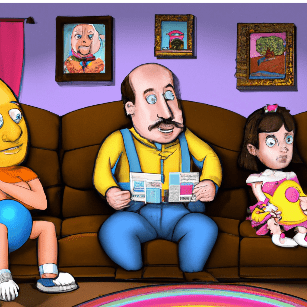Television has come a long way since its inception, evolving from a simple black-and-white screen to the diverse array of genres, styles, and storytelling techniques we see today. TV shows have become a staple in our everyday lives, captivating us with their compelling narratives, intriguing characters, and immersive worlds.
But what makes TV shows so enthralling?
How do they capture our imagination and leave a lasting impact on us?
Let’s delve into the art of storytelling in TV shows, exploring how they engage our emotions, challenge our perspectives, and transport us to new realms of imagination.
The Power of Emotion
One of the key aspects of TV storytelling is its ability to evoke emotion. Whether it’s laughter, tears, excitement, or suspense, TV shows have a unique power to connect with viewers on an emotional level. Through well-crafted story arcs, relatable characters, and poignant moments, TV shows can elicit many emotions that keep us invested in the story.
- The importance of relatable characters
TV shows often introduce us to characters we can relate to, empathize with, or aspire to be like. These characters can become our emotional anchors, drawing us into their world and making us emotionally invested in their journeys. From the witty and quirky characters of sitcoms to the complex and multi-dimensional characters of dramas, the human element in TV shows often resonates with viewers and makes the storytelling impactful. - The power of shared experiences
TV shows can also create a sense of community and shared experiences among viewers. Whether discussing the latest plot twist with friends, joining online fan communities, or attending watch parties, TV shows can foster a sense of belonging and connection among viewers. The emotional reactions and discussions that TV shows generate can be a source of joy, comfort, and camaraderie, further enhancing our engagement with the story.
Challenging Perspectives
TV shows can challenge our perspectives and broaden our horizons. They can tackle complex social issues, present diverse viewpoints, and shed light on different cultures, identities, and experiences. Through thought-provoking storytelling, TV shows can inspire us to think critically, question our assumptions, and see the world from different angles.
- Representation and diversity
TV shows have increasingly championed diversity and inclusion in recent years, portraying characters from marginalized communities and shedding light on their stories. This representation can challenge societal norms, break stereotypes, and open up discussions on important social issues. TV shows have the potential to provide a platform for underrepresented voices and create a more inclusive media landscape. - Tackling taboo topics
TV shows can also delve into taboo topics and spark conversations on sensitive issues that are often overlooked in mainstream media. From mental health and addiction to sexuality and politics, TV shows can shine a spotlight on complex topics that are relevant to our society. By addressing these issues through compelling storytelling, TV shows can raise awareness, foster empathy, and encourage dialogue, even on uncomfortable subjects.
Transporting Us to New Realms
TV shows can transport us to new realms of imagination, taking us on journeys to fictional worlds, historical settings, or distant galaxies. TV shows can ignite our sense of wonder through visually stunning visuals, immersive storytelling, and imaginative world-building and transport us to places we could never imagine.
- World-building and storytelling
TV shows can create rich, expansive fictional worlds that capture our imagination. From the intricate political intrigue of fantasy realms to the futuristic landscapes of sci-fi dystopias, TV shows can transport us to new worlds with their elaborate world-building. Coupled with compelling storytelling, these fictional universes can captivate our minds and keep us eagerly anticipating each episode, eager to explore more of the imaginative realms presented. - Historical Settings and cultural exploration
TV shows can also take us on journeys to the past, shedding light on different historical periods, cultures, and civilizations. Through meticulous attention to detail in costumes, settings, and language, TV shows can transport us to different eras and give us a glimpse into the rich tapestry of human history. This can ignite our curiosity, broaden our understanding of diverse cultures, and create a deep appreciation for the complexities of the past.
Conclusion
TV shows are not just a form of entertainment but a powerful medium of storytelling that has the ability to capture our imagination, evoke emotion, challenge our perspectives, and transport us to new realms. They can connect with us emotionally, foster a sense of community, and inspire us to think critically about the world around us.
Television shows reflect our society, showcasing diverse stories, characters, and experiences that can foster empathy, raise awareness, and encourage dialogue on important social issues. As viewers, we are fortunate to be able to immerse ourselves in the art of storytelling through TV shows, allowing us to experience the magic of storytelling in a unique and impactful way.
In conclusion, TV shows are not just a form of entertainment but a medium of storytelling that has the power to engage, challenge, and transport us. TV shows have become a vital part of our cultural landscape through their emotional resonance, thought-provoking perspectives, and imaginative world-building. So, grab your remote, settle into your favorite spot on the couch, and let yourself be captivated by the art of storytelling in TV shows.
Happy binge-watching!



